Roberts A.D. The Cambridge History of Africa, Volume 7: from 1905 to 1940
Подождите немного. Документ загружается.

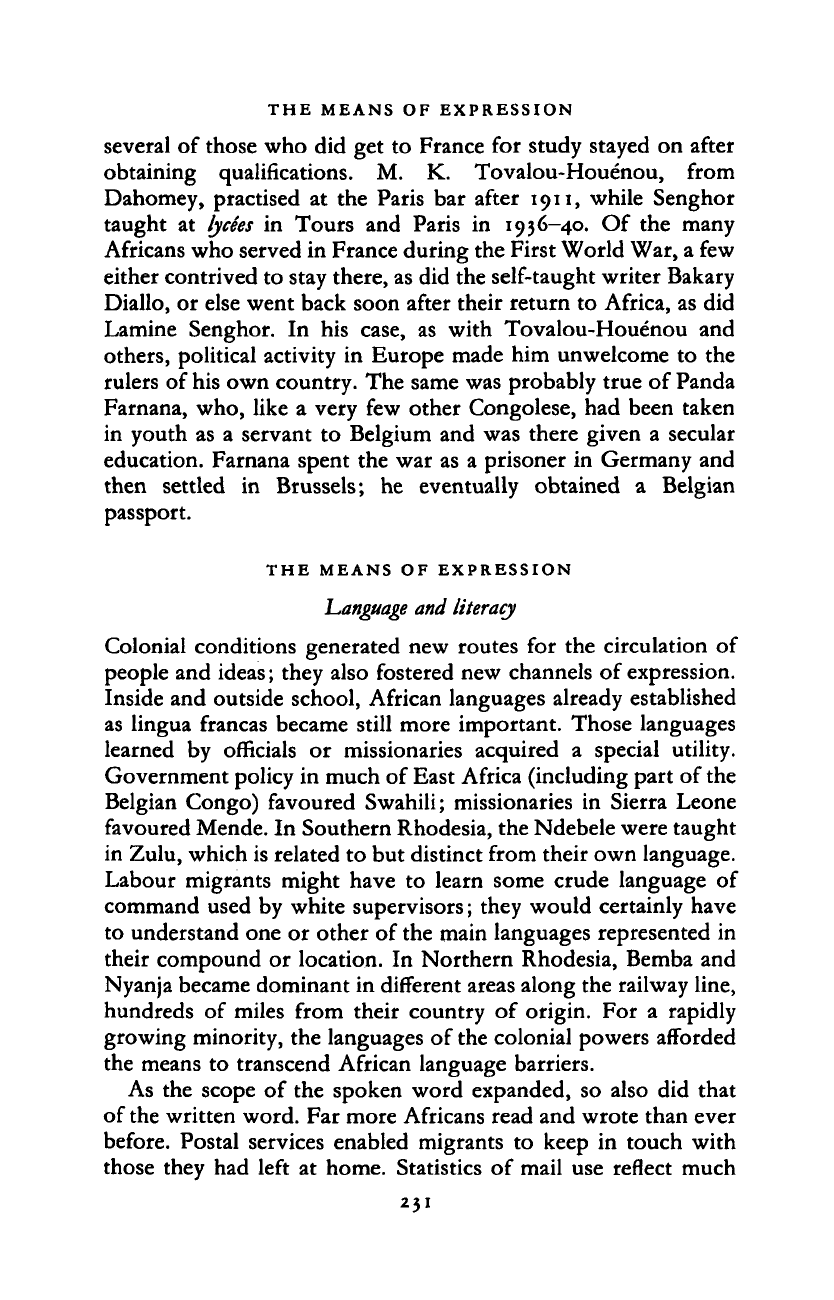
THE MEANS OF EXPRESSION
several of those who did get to France for study stayed on after
obtaining qualifications.
M. K.
Tovalou-Houenou, from
Dahomey, practised
at
the Paris bar after 1911, while Senghor
taught
at
lycees
in
Tours and Paris
in
1956-40.
Of
the many
Africans who served in France during the First World War, a few
either contrived to stay there, as did the self-taught writer Bakary
Diallo, or else went back soon after their return to Africa, as did
Lamine Senghor.
In
his case,
as
with Tovalou-Houenou and
others, political activity in Europe made him unwelcome to the
rulers of his own country. The same was probably true of Panda
Farnana, who, like
a
very few other Congolese, had been taken
in youth as
a
servant
to
Belgium and was there given
a
secular
education. Farnana spent the war as
a
prisoner in Germany and
then settled
in
Brussels;
he
eventually obtained
a
Belgian
passport.
THE MEANS OF EXPRESSION
Language and literacy
Colonial conditions generated new routes for the circulation of
people and ideas; they also fostered new channels of expression.
Inside and outside school, African languages already established
as lingua francas became still more important. Those languages
learned
by
officials
or
missionaries acquired
a
special utility.
Government policy in much of East Africa (including part of the
Belgian Congo) favoured Swahili; missionaries
in
Sierra Leone
favoured Mende. In Southern Rhodesia, the Ndebele were taught
in Zulu, which is related to but distinct from their own language.
Labour migrants might have
to
learn some crude language
of
command used by white supervisors; they would certainly have
to understand one or other of the main languages represented in
their compound or location. In Northern Rhodesia, Bemba and
Nyanja became dominant in different areas along the railway line,
hundreds
of
miles from their country
of
origin. For
a
rapidly
growing minority, the languages of the colonial powers afforded
the means to transcend African language barriers.
As the scope
of
the spoken word expanded, so also did that
of the written word. Far more Africans read and wrote than ever
before. Postal services enabled migrants
to
keep
in
touch with
those they had left
at
home. Statistics
of
mail use reflect much
231
Cambridge Histories Online © Cambridge University Press, 2008
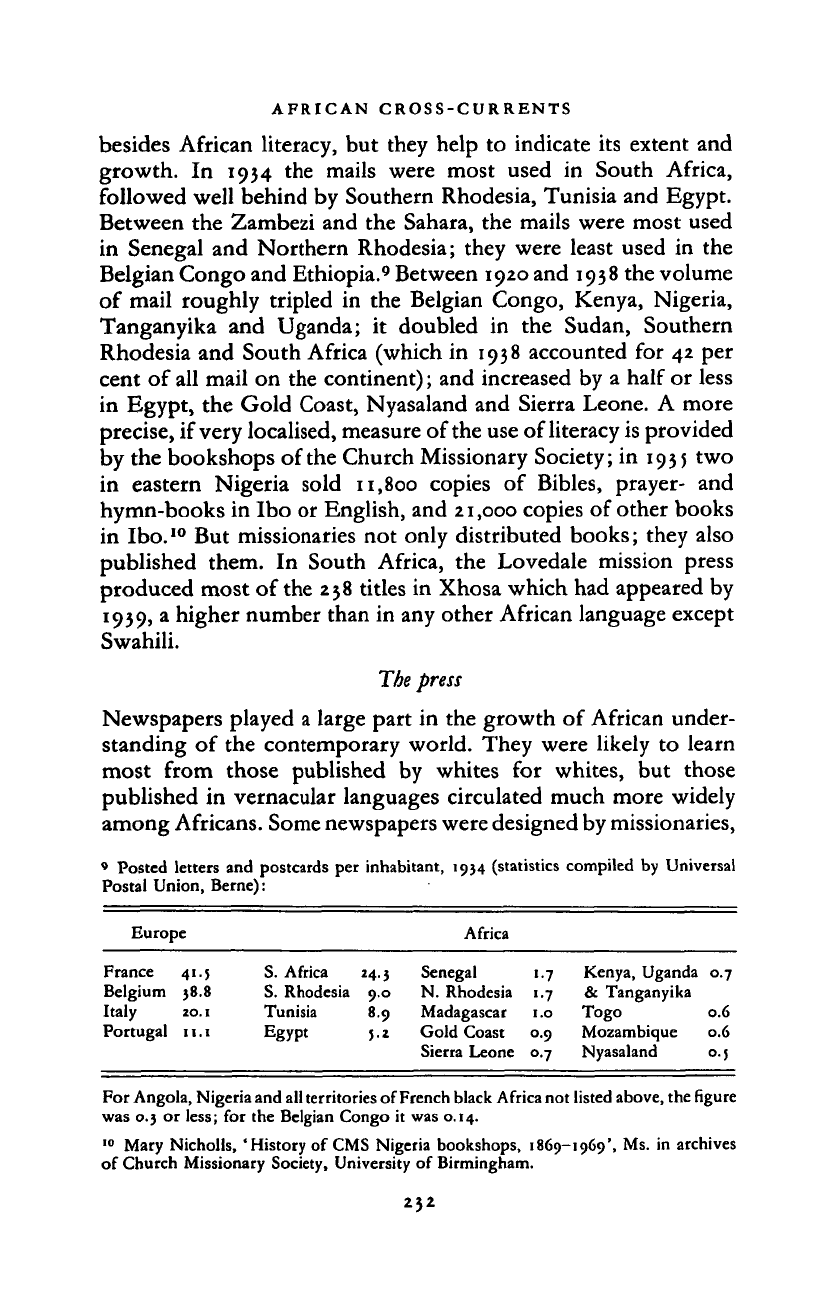
AFRICAN CROSS-CURRENTS
besides African literacy, but they help to indicate its extent and
growth. In 1934 the mails were most used in South Africa,
followed well behind by Southern Rhodesia, Tunisia and Egypt.
Between the Zambezi and the Sahara, the mails were most used
in Senegal and Northern Rhodesia; they were least used in the
Belgian Congo and Ethiopia.
9
Between 1920 and 1938 the volume
of mail roughly tripled in the Belgian Congo, Kenya, Nigeria,
Tanganyika and Uganda; it doubled in the Sudan, Southern
Rhodesia and South Africa (which in 1938 accounted for 42 per
cent of all mail on the continent); and increased by a half or less
in Egypt, the Gold Coast, Nyasaland and Sierra Leone. A more
precise, if very localised, measure of the use of literacy is provided
by the bookshops of the Church Missionary Society; in 1935 two
in eastern Nigeria sold 11,800 copies of Bibles, prayer- and
hymn-books in Ibo or English, and 21,000 copies of other books
in Ibo.
10
But missionaries not only distributed books; they also
published them. In South Africa, the Lovedale mission press
produced most of
the
238 titles in Xhosa which had appeared by
1939,
a higher number than in any other African language except
Swahili.
The press
Newspapers played a large part in the growth of African under-
standing of the contemporary world. They were likely to learn
most from those published by whites for whites, but those
published in vernacular languages circulated much more widely
among Africans. Some newspapers were designed by missionaries,
• Posted letters and postcards per inhabitant, 1934 (statistics compiled by Universal
Postal Union, Berne):
Europe Africa
France
Belgium
Italy
Portugal
41.j
38.8
zo.
1
11.1
S. Africa
S. Rhodesia
Tunisia
Egypt
24.3
9.0
8.9
5*
Senegal
N.
Rhodesia
Madagascar
Gold Coast
Sierra Leone
'•7
'•7
1.0
0.9
°-7
Kenya, Uganda
& Tanganyika
Togo
Mozambique
Nyasaland
°-7
0.6
0.6
0.5
For Angola, Nigeria and all territories of French black Africa not listed above, the figure
was 0.3 or less; for the Belgian Congo it was 0.14.
10
Mary Nicholls, 'History of CMS Nigeria bookshops, 1869-1969', Ms. in archives
of Church Missionary Society, University of Birmingham.
232
Cambridge Histories Online © Cambridge University Press, 2008
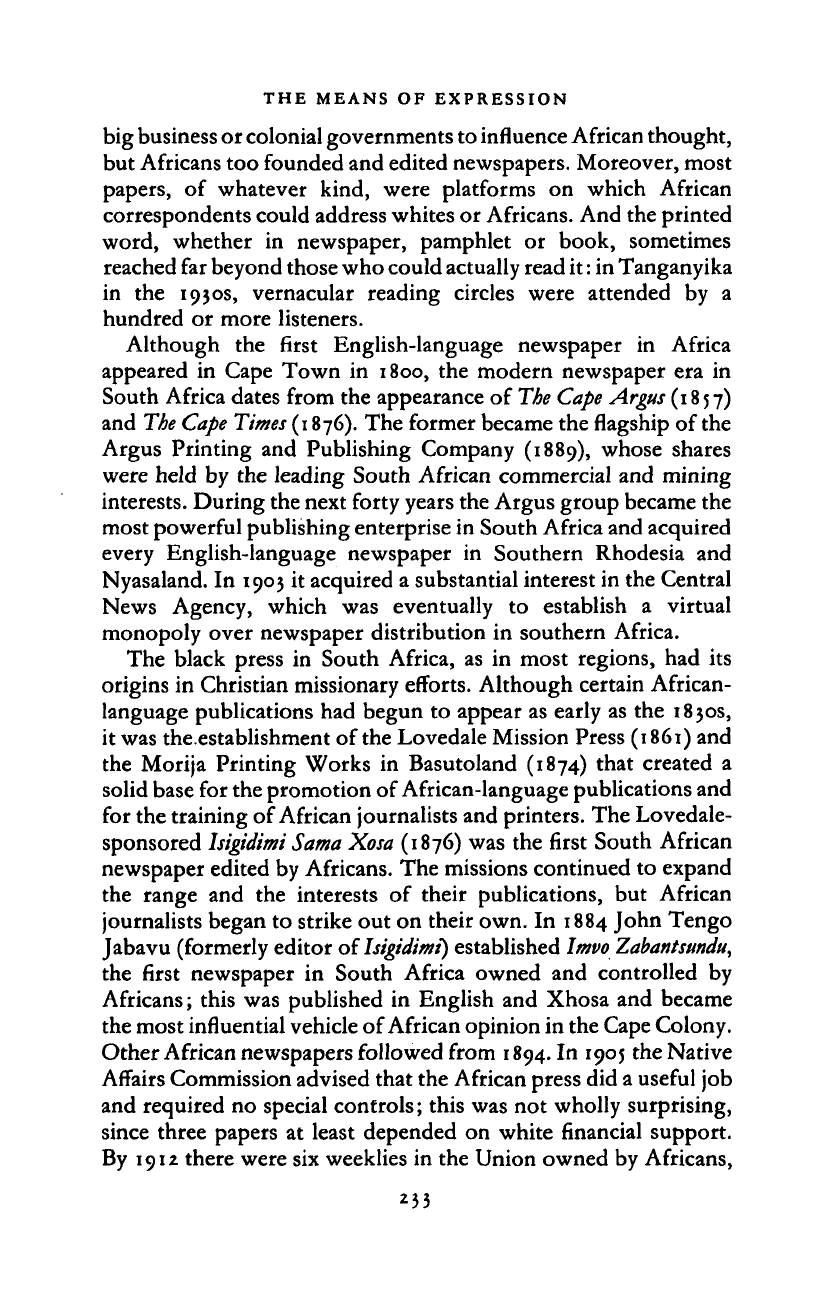
THE MEANS OF EXPRESSION
big business or colonial governments to influence African thought,
but Africans too founded and edited newspapers. Moreover, most
papers, of whatever kind, were platforms on which African
correspondents could address whites or Africans. And the printed
word, whether in newspaper, pamphlet or book, sometimes
reached far beyond those who could actually read
it:
in Tanganyika
in the 1930s, vernacular reading circles were attended by a
hundred or more listeners.
Although the first English-language newspaper in Africa
appeared in Cape Town in 1800, the modern newspaper era in
South Africa dates from the appearance of
The Cape
Argus (1857)
and
The Cape Times
(1876).
The former became the flagship of the
Argus Printing and Publishing Company (1889), whose shares
were held by the leading South African commercial and mining
interests. During the next forty years the Argus group became the
most powerful publishing enterprise in South Africa and acquired
every English-language newspaper in Southern Rhodesia and
Nyasaland. In 1903 it acquired a substantial interest in the Central
News Agency, which was eventually to establish a virtual
monopoly over newspaper distribution in southern Africa.
The black press in South Africa, as in most regions, had its
origins in Christian missionary efforts. Although certain African-
language publications had begun to appear as early as the 1830s,
it was the.establishment of
the
Lovedale Mission Press (1861) and
the Morija Printing Works in Basutoland (1874) that created a
solid base for the promotion of African-language publications and
for the training of African journalists and printers. The Lovedale-
sponsored
Isigidimi Sama
Xosa (1876) was the first South African
newspaper edited by Africans. The missions continued to expand
the range and the interests of their publications, but African
journalists began to strike out on their own. In 1884 John Tengo
Jabavu (formerly editor of
Isigidimi)
established
Imvo
Zabantsundu,
the first newspaper in South Africa owned and controlled by
Africans; this was published in English and Xhosa and became
the most influential vehicle of African opinion in the Cape Colony.
Other African newspapers followed from
1894.
In 1905 the Native
Affairs Commission advised that the African press did a useful job
and required no special controls; this was not wholly surprising,
since three papers at least depended on white financial support.
By 1912 there were six weeklies in the Union owned by Africans,
233
Cambridge Histories Online © Cambridge University Press, 2008

AFRICAN CROSS-CURRENTS
and two in Basutoland; all were published in English and one or
more African languages. There were also two fortnightly papers
in Coloured hands.
Between the two world wars, white influence over the black
press greatly increased. Since
the
foundation
of
the African
National Congress in 1912, its main organ had been the weekly
Abantu
Batho,
published
in
Johannesburg, and from 1918 this
reflected the most radical opinion
in
Congress. When African
mineworkers struck early in 1920, the Chamber of Mines tried to
kill oft" Abantu
Batho
by founding its own weekly,
Umtete/i
wa
Bantu. This was edited
by
Africans
and at
once became
an
important organ of middle-class African opinion, but it remained
firmly under white control. Abantu
Batbo
survived, but its finances
became ever more precarious and it was eventually forced to close
in 1931. Yet, despite the onset
of
economic depression, white
businessmen began
to
take
an
interest
in
African readers
as a
potential market:
in
1921
it
had been reckoned that one
in
ten
black South Africans was literate.
In
1932 a white liberal, B.
G.
Paver, founded the Bantu Press, a company which with financial
backing from Africans launched the
Bantu
World.
The editor, R.
V. S. Thema, was himself
a
Congress member and made the paper
a major forum
for
African writers;
it
was printed
in
several
languages and
in
1934 had
a
circulation
of
6,000, which
in
the
African market was
a
very large figure. However, the Bantu Press
had by then been taken over by the Argus group, and the last
African (Thema) on the board of directors was ousted in 1936.
The Bantu Press itself took over
Ilanga lase
Natal (founded in 1903)
in 1934 and in 1936 it took over
a
paper in Southern Rhodesia;
the successor, Bantu
Mirror,
catered for readers throughout British
Central Africa. Soon afterwards,
Imvo
also fell to the Bantu Press.
By 1941 there were eight newspapers
in
the Union (excluding
missionary publications) which were edited by Africans, but only
three were
not
exclusively white-owned; two
of
these were
published by the multiracial Communist Party of South Africa and
the third was
Inkundlaya
Bantu,
an English-Zulu monthly founded
in 1938 (and then called the
Territorial
Magazine).
The Coloured
press,
which had virtually disappeared between 1923 and 1932,
consisted of two weeklies, the
Sun
and the
Cape
Standard.
The two
main Indian newspapers during our period, both weekly, were
Indian
Opinion,
which Gandhi helped to found in 1903, and
Indian
Views, which was primarily addressed to Indian Muslims.
234
Cambridge Histories Online © Cambridge University Press, 2008
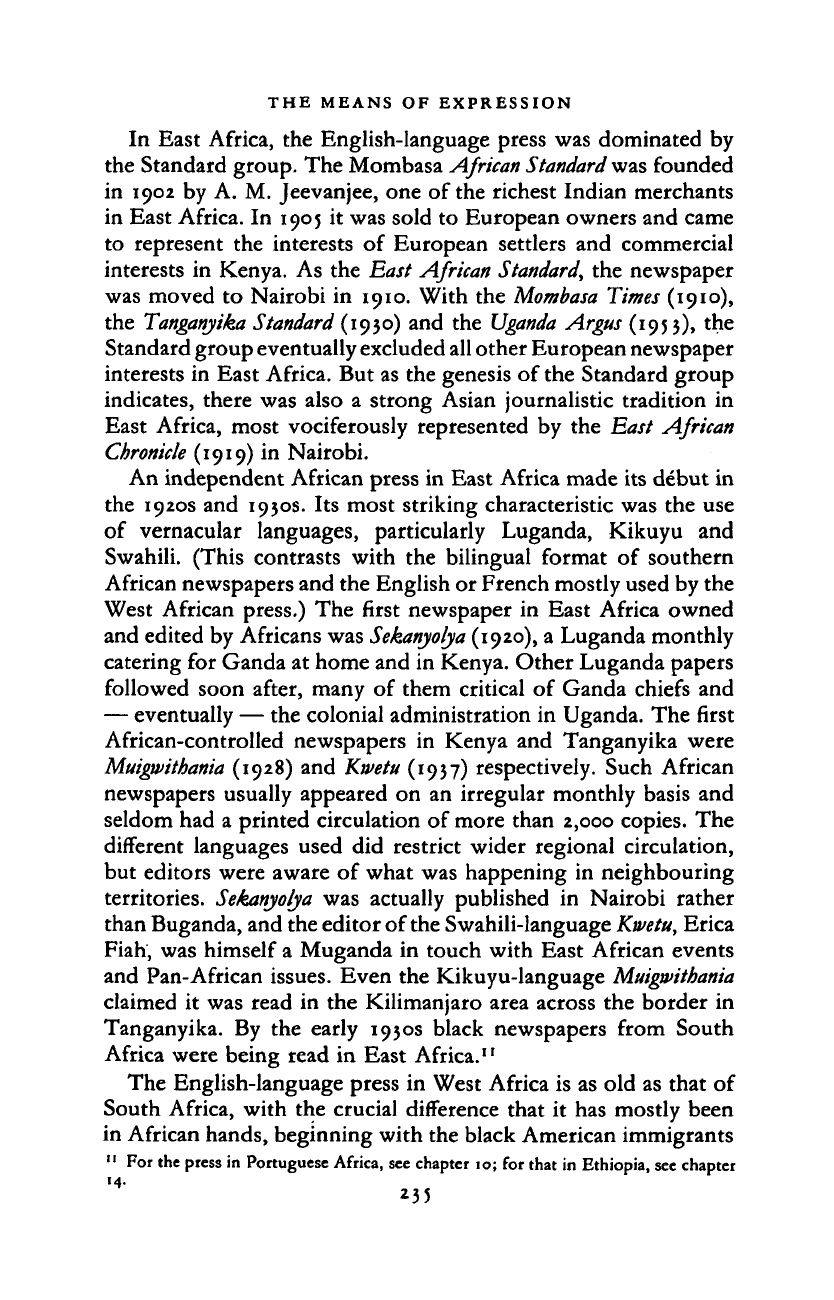
THE MEANS OF EXPRESSION
In East Africa, the English-language press was dominated by
the Standard group. The Mombasa African
Standard was
founded
in 1902 by A. M. Jeevanjee, one of the richest Indian merchants
in East Africa. In 1905 it was sold to European owners and came
to represent the interests of European settlers and commercial
interests in Kenya. As the East African
Standard,
the newspaper
was moved to Nairobi in 1910. With the
Mombasa
Times (1910),
the Tanganyika Standard (1930) and the
Uganda
Argus (1953), the
Standard group eventually excluded
all
other European newspaper
interests in East Africa. But as the genesis of the Standard group
indicates, there was also a strong Asian journalistic tradition in
East Africa, most vociferously represented by the East African
Chronicle
(1919) in Nairobi.
An independent African press in East Africa made its debut in
the 1920s and 1950s. Its most striking characteristic was the use
of vernacular languages, particularly Luganda, Kikuyu and
Swahili. (This contrasts with the bilingual format of southern
African newspapers and the English or French mostly used by the
West African press.) The first newspaper in East Africa owned
and edited by Africans was
Sekanyolya
(1920), a Luganda monthly
catering for Ganda at home and in Kenya. Other Luganda papers
followed soon after, many of them critical of Ganda chiefs and
— eventually — the colonial administration in Uganda. The first
African-controlled newspapers in Kenya and Tanganyika were
Muigwitbania
(1928) and
Kwetu
(1937) respectively. Such African
newspapers usually appeared on an irregular monthly basis and
seldom had a printed circulation of more than 2,000 copies. The
different languages used did restrict wider regional circulation,
but editors were aware of what was happening in neighbouring
territories.
Sekanyolya
was actually published in Nairobi rather
than Buganda, and the editor of the Swahili-Ianguage
Kwetu,
Erica
Fiah, was himself a Muganda in touch with East African events
and Pan-African issues. Even the Kikuyu-language
Muigwitbania
claimed it was read in the Kilimanjaro area across the border in
Tanganyika. By the early 1930s black newspapers from South
Africa were being read in East Africa."
The English-language press in West Africa is as old as that of
South Africa, with the crucial difference that it has mostly been
in African hands, beginning with the black American immigrants
11
For the press in Portuguese Africa, see chapter 10; for that in Ethiopia, see chapter
Cambridge Histories Online © Cambridge University Press, 2008

AFRICAN CROSS-CURRENTS
in Liberia
and the
freed slave populations
of
Sierra Leone. They
and their descendants established newspapers
all
along
the
West
African coast during
the
nineteenth century
— in
Monrovia,
Freetown, Cape Coast, Accra and Lagos. These newspapers were
aimed at
a
very small educated elite and
for
long were printed only
in English. Several lasted only
a few
years,
but
three Lagos
weeklies founded
in the
nineteenth century survived
to
1920
or
later, while
the
Gold Coast
Independent
continued from
1918
throughout our period. Newspaper circulation in Lagos increased
rapidly between 1918
and
1923, when that
of a
dozen weeklies
may have totalled around 8,000. Daily papers first appeared
in
Lagos
in
1925, Accra in 1927 and Freetown
in
1933. The
Nigerian
Daily Times, founded
in
1926,
was
published
by a
company
in
which expatriate trading firms predominated; it not only made use
of Reuters news agency
and
British broadcasts
but had
enough
capital to modernise its format and organise distribution through-
out Nigeria;
it
also attracted
the
bulk
of
expatriate advertisers.
Two other Lagos dailies were fully under African control, but
for
ten years there was
no
serious challenge
to
the Daily
Times.
Then
in 1937
the
West African Pilot was founded
by
Nnamdi Azikiwe,
who as a student and teacher in the USA had learned from radical
black journalism there and in 1934 had launched a successful daily
in
the
Gold Coast.
By the end of
1937
the
Pilot's populist style
and nationalist policies
had
gained
it a
circulation
of
9,000,
thereby doubling the total sales
of
Lagos dailies. Meanwhile there
had been a remarkable expansion elsewhere in southern Nigeria;
12
by
1937 six
provincial weeklies
had a
combined circulation
of
about 15,000,
of
which 3,000 belonged
to a
Yoruba-language
paper (others
had
been published
in
Lagos since 1923).
By comparison with British West Africa,
the
press
in
French
black Africa was
a
tender growth. This was due partly
to
the very
low levels
of
African literacy
and
partly
to
customs regulations
which favoured the import
of
French newspapers rather than
the
production
of
local papers.
The
white-owned press consisted
chiefly
of a
paper founded
in
Cameroun
in 1919 and
papers
founded
in
Dakar (1933)
and the
Ivory Coast (1938)
by a
firm
which already
had
papers
in
Tangier
and
Morocco.
The
first
African-owned paper
of any
consequence
was the
Voix
du
11
This
is
inferred from the government statistics given
in
Fred
I. A.
Omu,
Press and
politics in
Nigeria,
iSSo-ifj; (London, 1978), 263-4.
236
Cambridge Histories Online © Cambridge University Press, 2008
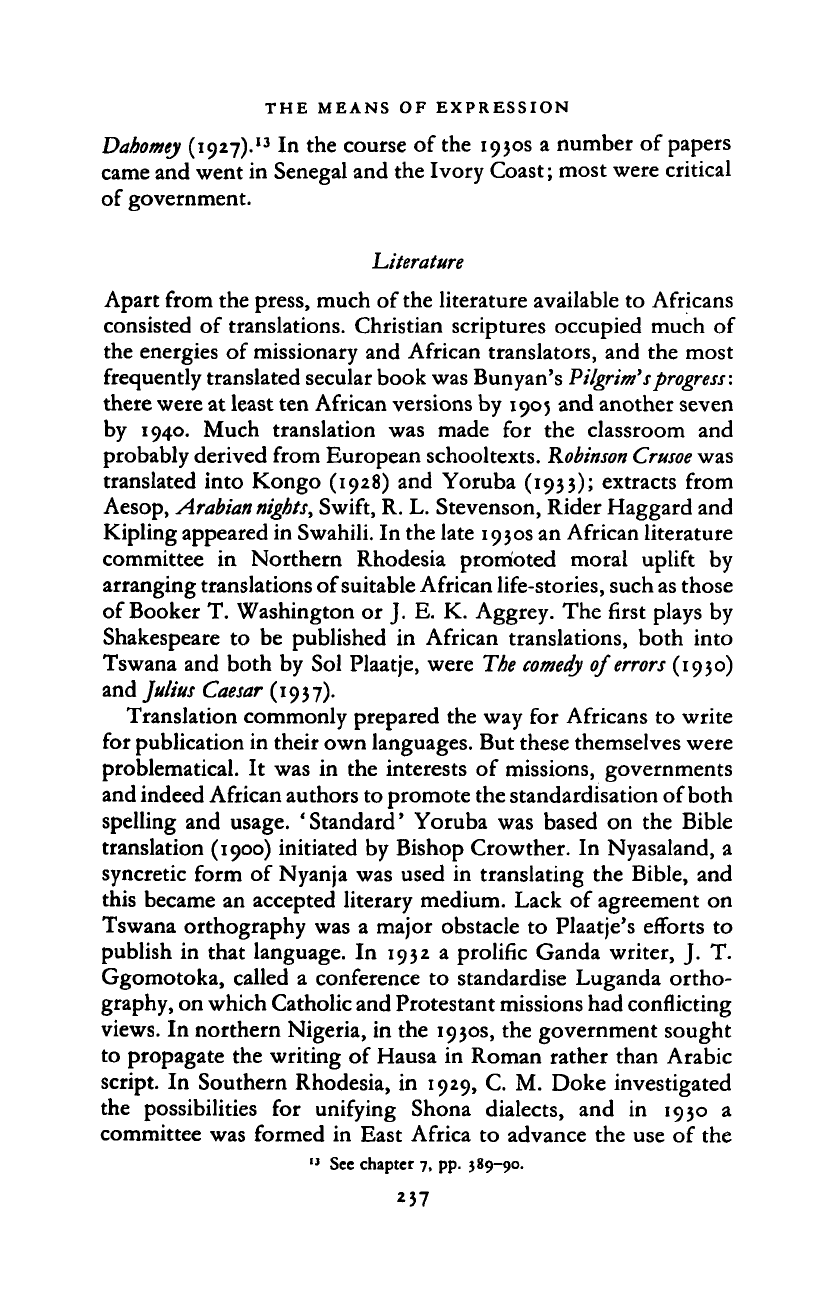
THE MEANS OF EXPRESSION
Dahomey
(i927).
I3
In the course of the 1930s a number of papers
came and went in Senegal and the Ivory Coast; most were critical
of government.
Literature
Apart from the press, much of the literature available to Africans
consisted of translations. Christian scriptures occupied much of
the energies of missionary and African translators, and the most
frequently translated secular book was Bunyan's
Pi/grim'sprogress:
there were at least ten African versions by 1905 and another seven
by 1940. Much translation was made for the classroom and
probably derived from European schooltexts.
Robinson Crusoe
was
translated into Kongo (1928) and Yoruba (1933); extracts from
Aesop,
Arabian
nights,
Swift, R. L. Stevenson, Rider Haggard and
Kipling appeared in Swahili. In the late 1930s an African literature
committee in Northern Rhodesia promoted moral uplift by
arranging translations of suitable African life-stories, such
as
those
of Booker T. Washington or J. E. K. Aggrey. The first plays by
Shakespeare to be published in African translations, both into
Tswana and both by Sol Plaatje, were The
comedy
of
errors
(1930)
and Julius Caesar (1937).
Translation commonly prepared the way for Africans to write
for publication in their own languages. But these themselves were
problematical. It was in the interests of missions, governments
and indeed African authors to promote the standardisation of both
spelling and usage. 'Standard' Yoruba was based on the Bible
translation (1900) initiated by Bishop Crowther. In Nyasaland, a
syncretic form of Nyanja was used in translating the Bible, and
this became an accepted literary medium. Lack of agreement on
Tswana orthography was a major obstacle to Plaatje's efforts to
publish in that language. In 1932 a prolific Ganda writer, J. T.
Ggomotoka, called a conference to standardise Luganda ortho-
graphy, on which Catholic and Protestant missions had conflicting
views.
In northern Nigeria, in the 1930s, the government sought
to propagate the writing of Hausa in Roman rather than Arabic
script. In Southern Rhodesia, in 1929, C. M. Doke investigated
the possibilities for unifying Shona dialects, and in 1930 a
committee was formed in East Africa to advance the use of the
13
See chapter 7, pp. J89-90.
237
Cambridge Histories Online © Cambridge University Press, 2008
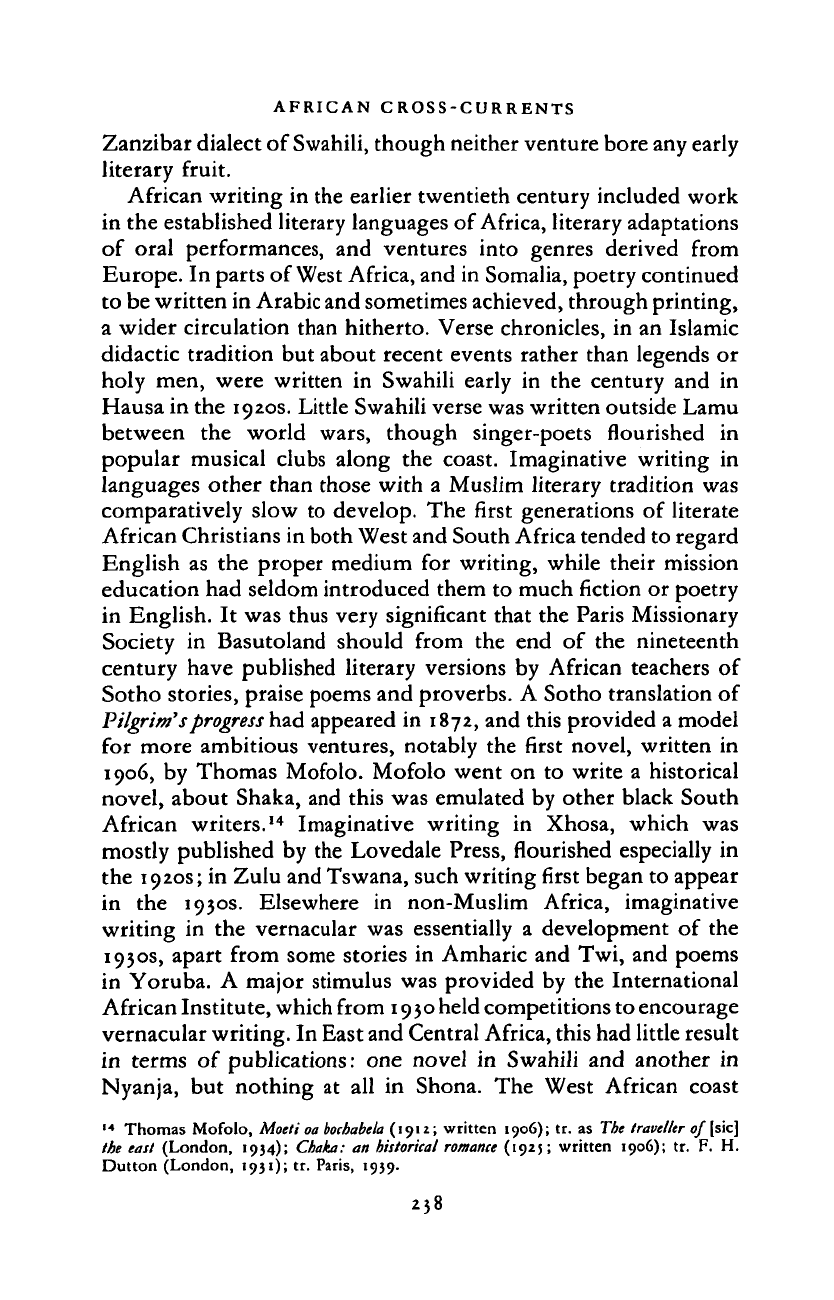
AFRICAN CROSS-CURRENTS
Zanzibar dialect of
Swahili,
though neither venture bore any early
literary fruit.
African writing in the earlier twentieth century included work
in the established literary languages of Africa, literary adaptations
of oral performances, and ventures into genres derived from
Europe. In parts of West Africa, and in Somalia, poetry continued
to be written in Arabic and sometimes achieved, through printing,
a wider circulation than hitherto. Verse chronicles, in an Islamic
didactic tradition but about recent events rather than legends or
holy men, were written
in
Swahili early
in
the century and
in
Hausa in the 1920s. Little Swahili verse was written outside Lamu
between
the
world wars, though singer-poets flourished
in
popular musical clubs along the coast. Imaginative writing
in
languages other than those with a Muslim literary tradition was
comparatively slow to develop. The first generations of literate
African Christians in both West and South Africa tended to regard
English as the proper medium for writing, while their mission
education had seldom introduced them to much fiction or poetry
in English.
It
was thus very significant that the Paris Missionary
Society
in
Basutoland should from the end
of
the nineteenth
century have published literary versions by African teachers of
Sotho stories, praise poems and proverbs. A Sotho translation of
Pilgrim's
progress
had appeared in 1872, and this provided a model
for more ambitious ventures, notably the first novel, written in
1906,
by Thomas Mofolo. Mofolo went on to write a historical
novel, about Shaka, and this was emulated by other black South
African writers.
14
Imaginative writing
in
Xhosa, which was
mostly published by the Lovedale Press, flourished especially in
the 1920s; in Zulu and Tswana, such writing first began to appear
in
the
1930s. Elsewhere
in
non-Muslim Africa, imaginative
writing
in
the vernacular was essentially
a
development
of
the
1930s, apart from some stories in Amharic and Twi, and poems
in Yoruba. A major stimulus was provided by the International
African Institute, which from
1930
held competitions to encourage
vernacular writing. In East and Central Africa, this had little result
in terms
of
publications: one novel
in
Swahili and another
in
Nyanja, but nothing
at
all
in
Shona. The West African coast
14
Thomas Mofolo, Moeti oa bocbabela (1912; written 1906); tr.
as
The travtlltr o/^[sic]
the east (London, 1954); Chaka:
an
historical romance (1925; written 1906);
tr. F. H.
Dutton (London, 1931); tr. Paris, 1959.
238
Cambridge Histories Online © Cambridge University Press, 2008
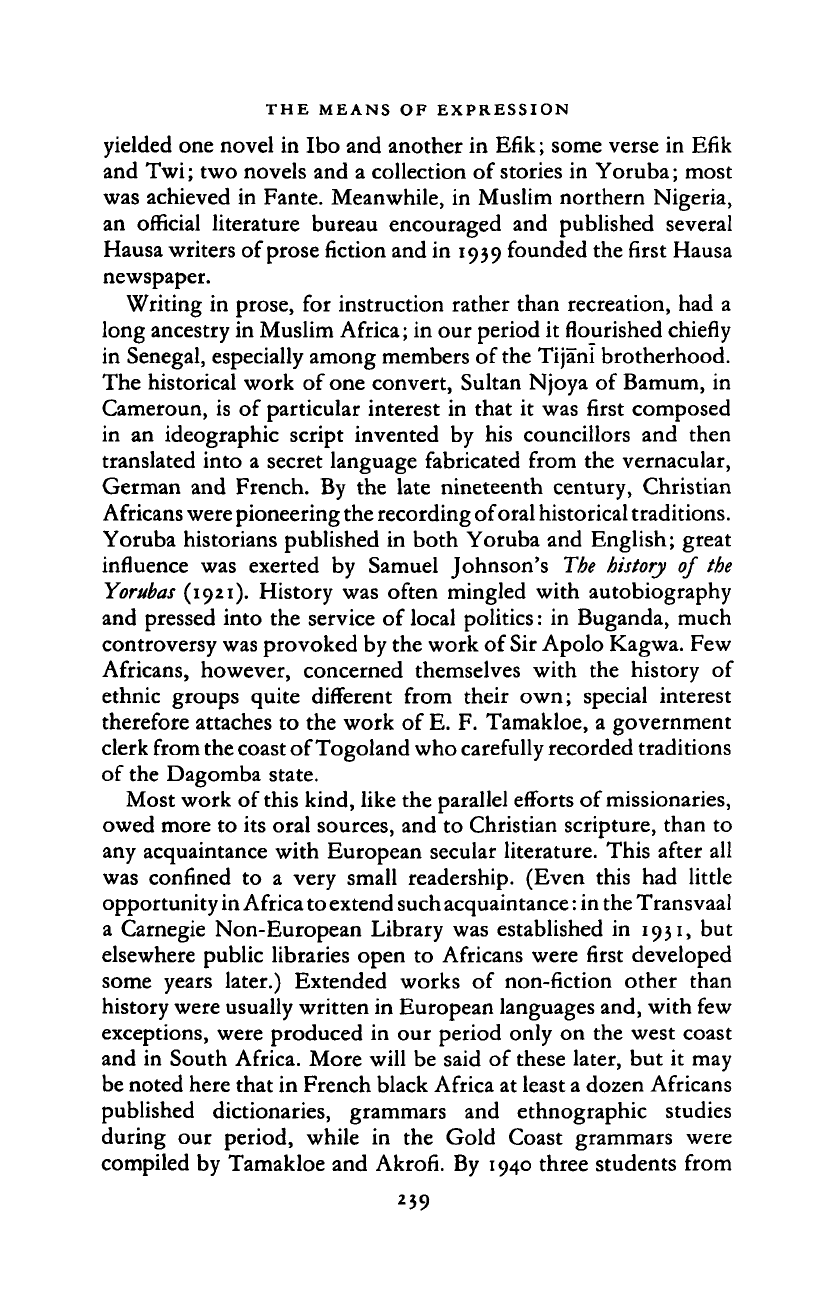
THE MEANS OF EXPRESSION
yielded one novel in Ibo and another in Efik; some verse in Efik
and Twi; two novels and a collection of stories in Yoruba; most
was achieved in Fante. Meanwhile, in Muslim northern Nigeria,
an official literature bureau encouraged and published several
Hausa writers of prose fiction and in 1939 founded the first Hausa
newspaper.
Writing in prose, for instruction rather than recreation, had
a
long ancestry in Muslim Africa; in our period it flourished chiefly
in Senegal, especially among members of the Tijani brotherhood.
The historical work of one convert, Sultan Njoya of Bamum, in
Cameroun, is of particular interest in that
it
was first composed
in
an
ideographic script invented
by
his councillors and then
translated into
a
secret language fabricated from the vernacular,
German and French. By the late nineteenth century, Christian
Africans were pioneering the recording of oral historical traditions.
Yoruba historians published in both Yoruba and English; great
influence was exerted
by
Samuel Johnson's The history
of
the
Yorubas
(1921). History was often mingled with autobiography
and pressed into the service of local politics: in Buganda, much
controversy was provoked by the work of Sir Apolo Kagwa. Few
Africans, however, concerned themselves with
the
history
of
ethnic groups quite different from their own; special interest
therefore attaches to the work of E. F. Tamakloe, a government
clerk from the coast of Togoland who carefully recorded traditions
of the Dagomba state.
Most work of this kind, like the parallel efforts of missionaries,
owed more to its oral sources, and to Christian scripture, than to
any acquaintance with European secular literature. This after all
was confined
to a
very small readership. (Even this
had
little
opportunity
in
Africa to extend such acquaintance: in the Transvaal
a Carnegie Non-European Library was established
in
1931, but
elsewhere public libraries open to Africans were first developed
some years later.) Extended works
of
non-fiction other than
history were usually written in European languages and, with few
exceptions, were produced in our period only on the west coast
and in South Africa. More will be said of these later, but
it
may
be noted here that in French black Africa at least a dozen Africans
published dictionaries, grammars
and
ethnographic studies
during
our
period, while
in the
Gold Coast grammars were
compiled by Tamakloe and Akrofi. By 1940 three students from
Cambridge Histories Online © Cambridge University Press, 2008
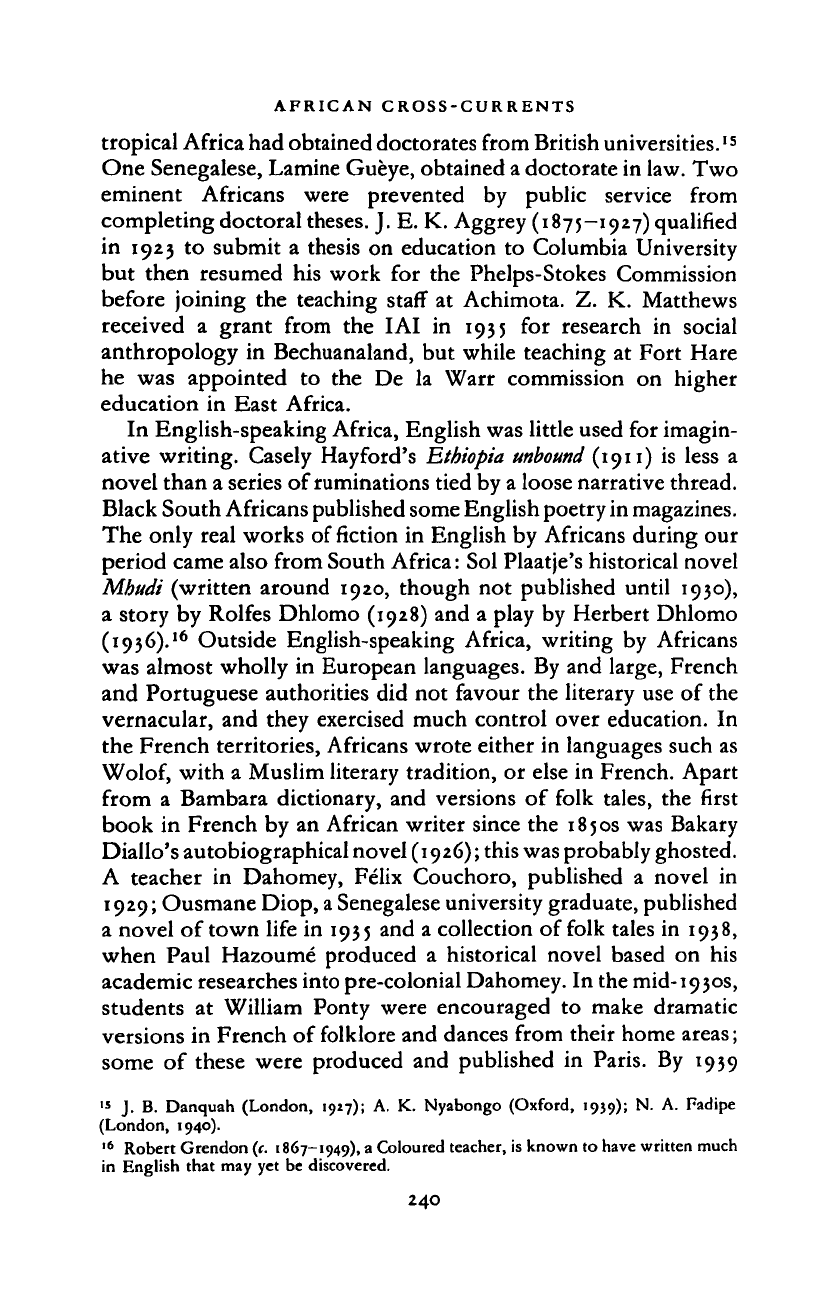
AFRICAN CROSS-CURRENTS
tropical Africa had obtained doctorates from British universities.
15
One Senegalese, Lamine Gueye, obtained a doctorate in law. Two
eminent Africans were prevented by public service from
completing doctoral
theses.
J. E. K. Aggrey (1875-1927) qualified
in 1923 to submit a thesis on education to Columbia University
but then resumed his work for the Phelps-Stokes Commission
before joining the teaching staff at Achimota. Z. K. Matthews
received a grant from the IAI in 1935 for research in social
anthropology in Bechuanaland, but while teaching at Fort Hare
he was appointed to the De la Warr commission on higher
education in East Africa.
In English-speaking Africa, English was little used for imagin-
ative writing. Casely Hayford's Ethiopia
unbound
(1911) is less a
novel than a series of ruminations tied by a loose narrative thread.
Black South Africans published some English poetry in magazines.
The only real works of fiction in English by Africans during our
period came also from South Africa: Sol Plaatje's historical novel
Mhudi (written around 1920, though not published until 1930),
a story by Rolfes Dhlomo (1928) and a play by Herbert Dhlomo
(1936).
16
Outside English-speaking Africa, writing by Africans
was almost wholly in European languages. By and large, French
and Portuguese authorities did not favour the literary use of the
vernacular, and they exercised much control over education. In
the French territories, Africans wrote either in languages such as
Wolof,
with a Muslim literary tradition, or else in French. Apart
from a Bambara dictionary, and versions of folk tales, the first
book in French by an African writer since the
18 5 os
was Bakary
Diallo's autobiographical novel
(1926);
this was probably ghosted.
A teacher in Dahomey, Felix Couchoro, published a novel in
1929;
Ousmane Diop,
a
Senegalese university graduate, published
a novel of town life in 1935 and a collection of folk tales in 1938,
when Paul Hazoume produced a historical novel based on his
academic researches into pre-colonial Dahomey. In the mid-i93os,
students at William Ponty were encouraged to make dramatic
versions in French of folklore and dances from their home areas;
some of these were produced and published in Paris. By 1939
15
J. B. Danquah (London, 1927); A. K. Nyabongo (Oxford, 1959); N. A. Fadipe
(London, 1940).
16
Robert Grendon
(c.
1867-1949), a Coloured teacher, is known to have written much
in English that may yet be discovered.
240
Cambridge Histories Online © Cambridge University Press, 2008
